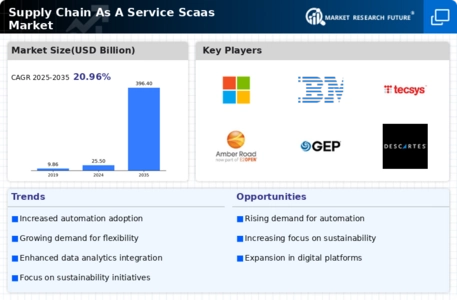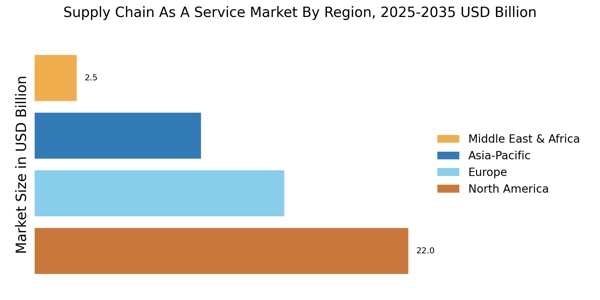Rising Demand for Flexibility
The Supply Chain As A Service Scaas Market is experiencing a notable increase in demand for flexible supply chain solutions. Businesses are increasingly seeking to adapt to changing market conditions and consumer preferences. This flexibility allows companies to scale operations up or down based on real-time needs, which is particularly crucial in a fast-paced economic environment. According to recent data, approximately 70% of organizations are prioritizing flexibility in their supply chain strategies. This trend indicates a shift towards more agile supply chain models, which can respond swiftly to disruptions and opportunities. As a result, service providers in the Supply Chain As A Service Scaas Market are innovating their offerings to meet these evolving demands, thereby enhancing their competitive edge.
Increased Regulatory Compliance
The Supply Chain As A Service Scaas Market is also being shaped by the need for increased regulatory compliance. As governments and regulatory bodies impose stricter guidelines on supply chain practices, businesses are compelled to adapt their operations accordingly. Compliance with regulations related to safety, environmental standards, and labor practices is becoming increasingly complex. This complexity drives organizations to seek Scaas solutions that can help them navigate these regulatory landscapes effectively. Service providers in the Supply Chain As A Service Scaas Market are responding by offering compliance-focused services that ensure adherence to local and international regulations. This trend not only mitigates risks but also enhances the overall reputation of businesses in the marketplace.
Growing Focus on Cost Efficiency
Cost efficiency remains a paramount concern for businesses, significantly influencing the Supply Chain As A Service Scaas Market. Organizations are increasingly looking for ways to reduce operational costs while maintaining service quality. The adoption of Scaas solutions allows companies to outsource non-core functions, thereby reducing overhead expenses. Data indicates that businesses utilizing Scaas can achieve cost savings of up to 25% compared to traditional supply chain models. This focus on cost efficiency is driving companies to seek out service providers that can deliver tailored solutions, enabling them to allocate resources more effectively. As a result, the Supply Chain As A Service Scaas Market is evolving to offer more competitive pricing structures and value-added services.
Integration of Advanced Technologies
The integration of advanced technologies is a driving force in the Supply Chain As A Service Scaas Market. Technologies such as artificial intelligence, machine learning, and the Internet of Things are being increasingly adopted to optimize supply chain operations. These technologies enable real-time data analysis, predictive analytics, and enhanced visibility across the supply chain. Recent studies suggest that companies leveraging these technologies can improve operational efficiency by up to 30%. This technological advancement not only streamlines processes but also enhances decision-making capabilities, allowing businesses to respond proactively to market changes. Consequently, the Supply Chain As A Service Scaas Market is witnessing a surge in demand for tech-enabled services that can provide these advanced capabilities.
Emphasis on Customer-Centric Supply Chains
The emphasis on customer-centric supply chains is a pivotal driver in the Supply Chain As A Service Scaas Market. Companies are recognizing the importance of aligning their supply chain strategies with customer expectations and preferences. This shift towards customer-centricity involves enhancing service levels, improving delivery times, and personalizing offerings. Data suggests that organizations that prioritize customer experience in their supply chain operations can achieve a 20% increase in customer satisfaction. As a result, the Supply Chain As A Service Scaas Market is witnessing a growing demand for services that facilitate better customer engagement and responsiveness. Service providers are innovating their solutions to support businesses in creating more tailored and responsive supply chains.

















